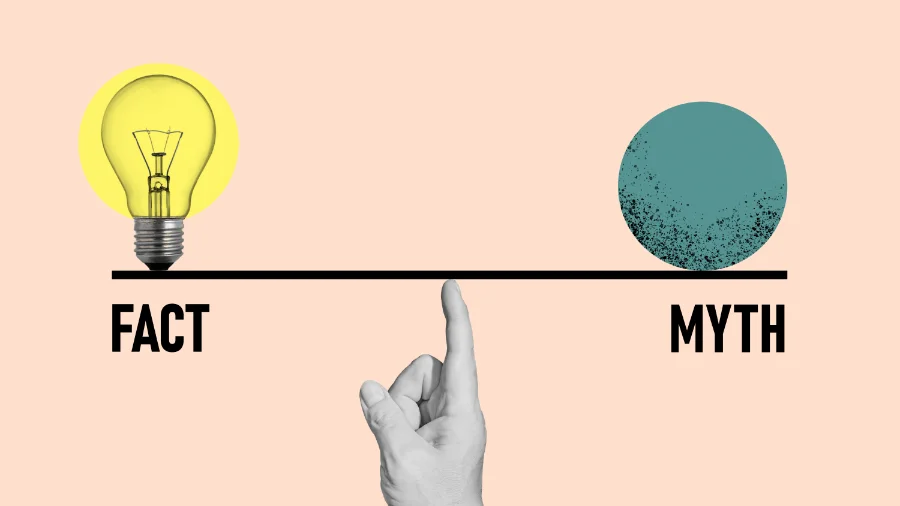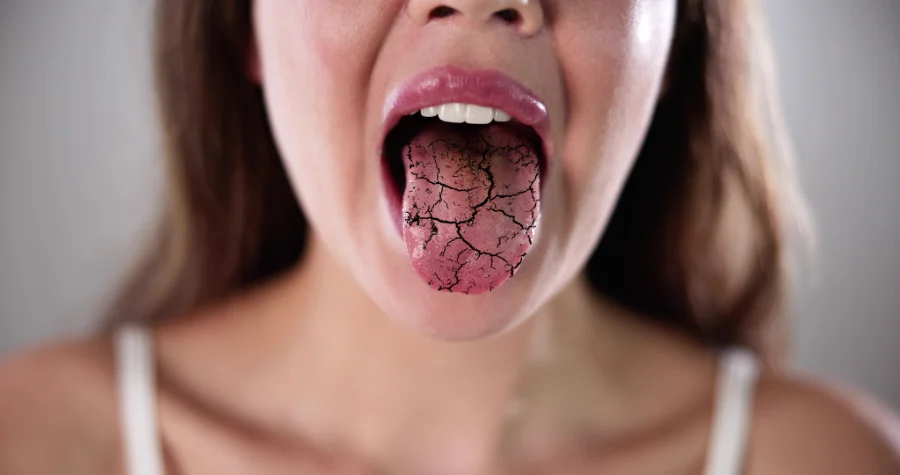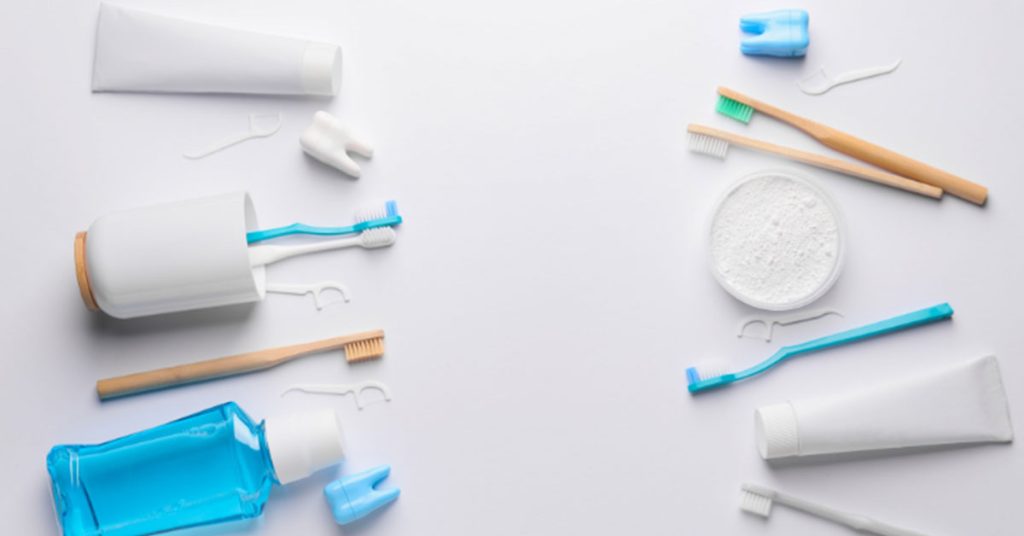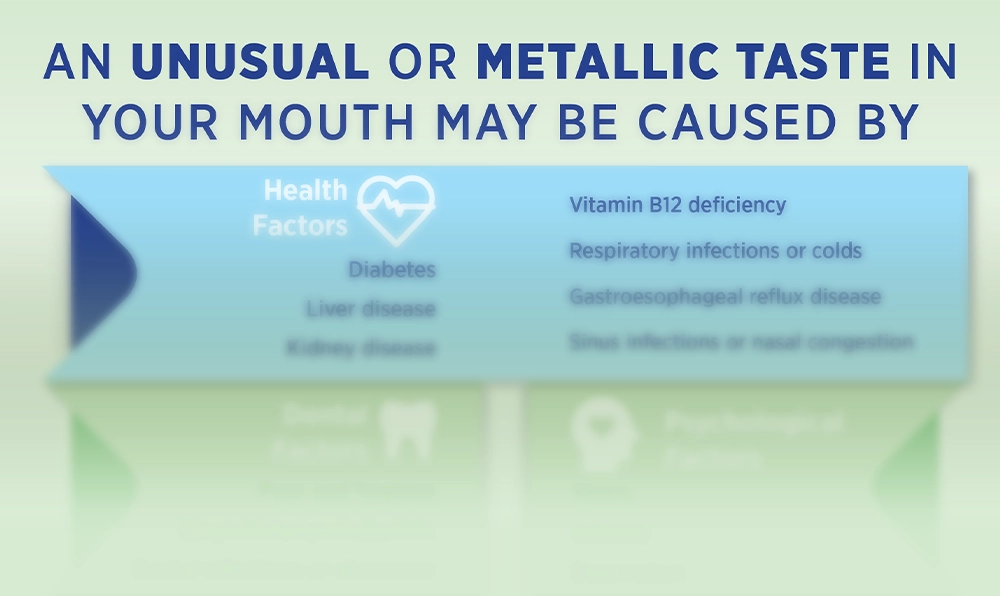
Ever wake up with a weird taste in your mouth that just won’t go away? You’re sipping your morning coffee, and suddenly, there it is – a lingering, unpleasant metallic taste.
It’s not just your morning brew gone wrong. It’s an actual condition known as dysgeusia or more commonly metallic taste in mouth.
This odd sensation can be more than just a nuisance; it often signals something deeper going on in your body. From dental issues to systemic health conditions, various factors can play a role. This article gets into the nitty-gritty of what causes this metallic intruder in your mouth, how to tackle it effectively, and ways to prevent its unwelcome return.
Have you ever had that odd, lingering taste in your mouth that feels like you’ve just licked a coin? This sensation is known clinically as dysgeusia.
It’s a puzzling and sometimes annoying experience where your taste buds seem to be on a different wavelength. This metallic taste can affect how foods and drinks taste, often leaving a consistently unpleasant flavor.

So, what’s the deal with this strange taste? The causes of metallic taste are varied and can range from harmless to something that warrants a closer look.
One of the most frequent triggers is poor oral hygiene. When plaque and other substances build up in your mouth, they can cause an array of dental problems, including this weird metallic sensation.
It’s like leaving leftovers in the fridge for too long. Eventually, they’ll start to taste off.
Another usual suspect is medication. Certain prescriptions, especially those used in chemotherapy or heart medications, have a side effect that leaves a metallic flavor in your mouth.
Environmental factors can also play a role. Exposure to certain chemicals, like those found in pesticides or industrial substances, can alter your sense of taste. It’s akin to walking into a room with a strong smell. Soon, it’s all you can notice.
Interestingly, various health conditions can also be behind this peculiar taste. Infections, such as those affecting the sinuses or the middle ear, can temporarily tweak your taste buds. It’s similar to how a cold can affect your sense of smell.
Some gastrointestinal issues, like acid reflux or indigestion, can cause a metallic taste too. When stomach acids make their way up to your mouth, they can leave behind a bitter, metallic residue.
Even hormonal changes, like those during pregnancy, can bring about this taste. It’s as if your body’s natural chemistry set is experimenting with new reactions.
A lack of certain vitamins and minerals in your diet can lead to a metallic taste. For instance, deficiencies in vitamins B12 and D or minerals like zinc and iron can disrupt your taste.
While most causes of metallic taste are not severe, it’s important not to ignore this symptom if it persists. In some cases, it could be a sign of more serious health conditions like kidney or liver problems, diabetes, or certain cancers. These conditions can affect the body’s ability to filter and eliminate substances, which can lead to changes in taste.
Recognizing the various causes of metallic taste is the first step in addressing this odd sensation. Whether it’s a simple case of switching toothpaste or a sign to consult a doctor, understanding why it happens is crucial in finding the right solution.

Why do I have a metallic taste in my mouth? This question often leads people down a rabbit hole of misconceptions. Understanding what it’s not helps in getting closer to the actual reasons behind this sensation.
One common myth is that experiencing a metallic taste in your mouth is always a sign of a severe illness. While it’s true that this taste can be a symptom of certain medical conditions, it’s not always a cause for alarm.
More often, it’s linked to benign factors like dietary choices, minor infections, or the side effects of medications. Just like a car making a strange noise doesn’t always mean a major breakdown, a metallic taste in your mouth isn’t always a dire sign.
Another widespread belief is that medications are the sole cause of a metallic taste in the mouth. While many drugs, especially certain antibiotics and chemotherapy treatments, can cause this taste as a side effect, they are not the only culprits.
The reality is more nuanced. Factors like dental issues, vitamin deficiencies, and even some foods can contribute to this sensation. It’s similar to assuming that a light bulb flickers only because of an electrical issue, ignoring the fact that the bulb itself might be faulty.
Many people think that improving oral hygiene will always fix a metallic taste in the mouth. Good oral hygiene is crucial, but it’s not a universal solution to this problem.
While brushing and flossing can help, especially if the taste is due to dental issues, they might not resolve the taste caused by other factors like systemic conditions or dietary imbalances. It’s like cleaning the windows of your house when the issue is actually in the plumbing.
A common misunderstanding is thinking that a metallic taste is merely a nuisance related to the taste buds, with no further implications. However, this taste can sometimes be a clue to underlying health issues or nutritional deficiencies.
It’s like dismissing a persistent cough as just an annoyance without considering it could be a symptom of a larger health issue. Paying attention to this taste, especially if it lingers, can be important in understanding your overall health.
The belief that a metallic taste is a sure sign of poisoning is another myth. While certain types of heavy metal poisoning can cause a metallic taste, it’s a rare occurrence. Most often, this taste is due to much less alarming reasons.

Oral health plays a pivotal role in our overall well-being, and its impact on taste is significant. One of the lesser-known effects of poor oral hygiene is the development of a metallic taste in the mouth. This unpleasant sensation can be a direct result of several oral health issues.
Common indicators of poor oral hygiene include sensitive teeth, tooth pain, swollen or bleeding gums, mouth ulcers, bad breath, pain while chewing, and dry mouth, also known as xerostomia. These symptoms are not just discomforting but can also lead to more serious oral health issues if left unchecked.
Neglecting proper oral care, like brushing less than twice a day, avoiding flossing, or frequently consuming sugary or acidic foods, can increase plaque and bacteria in the mouth.
This build-up not only raises the risk of infections but can also alter the taste receptors on your tongue, leading to that unwanted metallic taste. Over time, persistent poor oral hygiene can progress to gingivitis and potentially periodontal disease.
Poor oral hygiene can also affect the salivary glands which can lead to reduced saliva production and dry mouth symptoms. Saliva is crucial for neutralizing acids and washing away food particles.
Without adequate saliva, you may experience not only discomfort but also a change in your taste perception, including the development of a metallic taste.
Metallic taste can negatively impact your overall health and quality of life. It often leads to an aversion to certain foods, which can result in poor nutritional choices.
To compensate for the unpleasant taste, some people might gravitate towards spicier, saltier, or sweeter foods which can inadvertently increase their intake of sodium and sugar. This shift in diet can lead to additional health problems.
Interestingly, individuals with dysgeusia might increase their water intake due to the sensation of a dry mouth. While seeming beneficial, this can pose risks like polyuria and increased fall risk in older adults. This example shows how a simple issue like metallic taste can have far-reaching effects on our health behaviors.
To reduce the risk of developing a metallic taste, it’s important to follow a robust oral hygiene routine. This includes brushing teeth for at least two minutes, twice a day, and flossing regularly to prevent bone loss around teeth. Using an alcohol-free mouth rinse, such as MetaQil, can help reduce foreign bacteria in the mouth.
For those experiencing dry mouth symptoms, immediate remedies are essential to avoid further oral complications. Incorporating a tongue scraper into your oral care routine can also be beneficial, as it helps remove plaque that can accumulate on the tongue and lead to bad breath. Regular dental cleanings, ideally every six months, are crucial for maintaining oral health and reducing the risk of oral diseases.
In addition to standard oral hygiene practices, using specific products designed for metallic taste relief, like MetaQil mouth rinse, can provide comfort and improve your quality of life. These products are formulated to target the causes of metallic taste and offer immediate relief.

Metallic taste in the mouth can be more than just a nuisance. It’s often a signal from your body indicating underlying health conditions. Understanding these conditions is crucial for identifying the root cause and seeking appropriate treatment.
Several health conditions can lead to the experience of a metallic taste. These include:
Chemotherapy and radiation are lifesaving treatments for cancer, but they come with a range of side effects, including changes in taste perception. Patients undergoing these treatments often report a persistent metallic taste. This condition significantly affects their ability to enjoy food and can lead to nutritional deficiencies and weight loss.
The reason for this altered taste lies in the nature of the treatments. Chemotherapy drugs and radiation target rapidly dividing cells, a characteristic of cancer cells.
Unfortunately, this also affects healthy cells in the body, including taste bud cells. The result is a distorted sense of taste, with many patients describing their food as having a metallic or chemical flavor.
Certain chemotherapy drugs are more likely to cause taste changes than others. These include carboplatin, cisplatin, and methotrexate, among others. The metallic taste often begins shortly after treatment commences and can persist for a duration that varies from patient to patient.
Radiation therapy, particularly when targeting the head and neck area, can directly impact the taste buds and salivary glands. This can result in not only a metallic taste but also a dry mouth, which further exacerbates taste disturbances. Patients might find that their favorite foods taste bland, overly bitter, or metallic.

Managing dysgeusia in chemotherapy and radiation patients involves several strategies. Here are some to consider:
Upper respiratory infections, including the common cold, sinusitis, and COVID-19, can lead to a temporary change in taste sensations. A frequent complaint among patients is a persistent metallic taste, even in the absence of food intake.
These infections can cause inflammation and swelling in the nasal passages and throat, which can directly impact the taste buds. The primary mechanism is the reduction in the sense of smell, which is closely linked to taste. When the nasal passages are blocked or inflamed, the ability to smell diminishes which leads to changes in taste perception.
COVID-19 has brought significant attention to this issue, as many infected individuals experience a loss of taste and smell. For some, this symptom persists long after other symptoms have resolved. This indicates a more prolonged impact on the taste buds and olfactory sensors.
The exact reason for this prolonged effect is still under study, but it is believed to be related to the virus’s impact on the nerve cells related to smell and taste.
Managing dysgeusia caused by upper respiratory infections focuses on treating the infection itself and providing relief for symptoms. Here are some strategies to consider:

Dementia, a condition marked by a decline in memory and cognitive abilities, can also lead to changes in taste perception. Individuals with dementia often experience a metallic or altered taste, which can significantly impact their appetite and dietary habits.
The progression of dementia involves changes in the brain that can affect the nerves connected to taste buds. These neurological changes can disrupt the way tastes are perceived which leads to an altered or metallic taste sensation.
As dementia advances, the ability to taste diminishes, often leading to a preference for strongly flavored or sugary foods.
This change in taste can result in nutritional challenges. Dementia patients might show an increased liking for unhealthy foods, leading to nutritional imbalances.
They may also experience a reduced interest in eating due to the altered taste which can contribute to weight loss and malnutrition.
Managing dysgeusia in dementia involves a careful approach to diet and eating habits. Here are some to consider:

Dry mouth, or xerostomia, is a condition where the salivary glands don’t produce enough saliva. This lack of saliva can lead to various oral health issues, including a significant impact on taste perception. Without adequate saliva, individuals may experience a persistent metallic taste.
Dry mouth can result from various factors, including:
Saliva plays a crucial role in the process of tasting food. It helps to dissolve food particles, making them more accessible to taste buds. Saliva also acts as a buffer against acids and helps to maintain a healthy balance of bacteria in the mouth.
When saliva production is reduced, the balance is disrupted, leading to an altered taste sensation, often described as metallic.
In addition to affecting taste, dry mouth can lead to other complications. These include:

Effective management of dry mouth involves a combination of lifestyle changes, medical interventions, and supportive care. Some to consider include:
Effective management of metallic taste depends on addressing the underlying health conditions.
For chemotherapy and radiation patients, MetaQil Oral Rinse can provide immediate relief. In cases of upper respiratory infections, treatment of the infection itself may alleviate the symptoms.
For dementia patients, adjusting diet and using products like MetaQil can help manage taste changes. Addressing dry mouth through improved oral hygiene and appropriate treatments can also reduce the occurrence of metallic taste.
Diet plays a crucial role in managing the metallic taste in the mouth. Certain foods and beverages can either exacerbate or alleviate this condition.
Foods to include are fresh fruits and vegetables. They can help cleanse the palate and reduce the metallic taste. Citrus fruits like oranges and lemons are particularly effective.
Including mild-flavored foods such as chicken, fish, eggs, and dairy products can also be beneficial, as they are less likely to contribute to a metallic taste.
Foods to avoid are highly processed foods, canned goods, and foods high in preservatives as they can often worsen the metallic taste. It’s also advisable to reduce the intake of red meat, fried foods, and overly sweetened desserts, as they can intensify the unwanted flavor.
Preparing meals with a variety of herbs and mild spices can help mask the metallic taste. Marinating meats in sweet fruit juices, wines, or mild sauces can also neutralize metallic flavors.
Staying well-hydrated is a simple yet effective way to combat the metallic taste often experienced with dysgeusia. Drinking ample water keeps the mouth rinsed and dilutes the compounds contributing to the metallic taste.
Beyond just water, incorporating green tea into your hydration routine can be particularly beneficial. Green tea, known for its refreshing properties and mild flavor, helps to cleanse the palate.
The type of utensils you use can also impact the intensity of the metallic taste. Metal utensils, especially those made from certain alloys, can interact with the compounds in your saliva and intensify the metallic flavor. Switching to plastic or wooden utensils can significantly reduce this effect.
Incorporating natural flavor enhancers like mint and citrus can offer temporary yet immediate relief from dysgeusia. Chewing mint gum stimulates saliva production, which helps in washing away the metallic taste. The strong, refreshing flavor of mint can also overpower the metallic taste, providing a sense of relief.
Similarly, sucking on citrus-flavored candies or lozenges can help. The acidity and strong flavor profile of citrus fruits like lemon, orange, and lime are effective in masking the unpleasant taste, giving your taste buds a much-needed break.

For individuals experiencing metallic taste due to specific health conditions, certain dietary adjustments can be particularly helpful.
If you’re suffering from dry mouth, avoiding spicy and acidic foods is important, as these can irritate the mouth. Including saliva-stimulating foods like tart fruits can be beneficial.
Patients undergoing chemotherapy may find that cold or room-temperature foods are more palatable. Foods with a smooth texture, like puddings or yogurt, can also be easier to tolerate.
Women experiencing a metallic taste during pregnancy can benefit from snacking on crackers and other bland foods to keep the metallic taste at bay. Staying hydrated is also key.
In cases where metallic taste is linked to nutritional deficiencies, supplements can help. It’s important to consult with a healthcare provider before starting any supplement regimen, especially for individuals with health conditions or those taking medications.
MetaQil is a groundbreaking product in the realm of oral care. It presents a new and effective solution for those grappling with the challenge of metallic taste, also known as dysgeusia.
This innovative mouth rinse has been specifically designed to tackle the uncomfortable and often persistent sensation of having a metallic flavor in the mouth.

Developed with scientific precision, MetaQil works by targeting the causes of metallic taste at their root. Its unique formulation is crafted to interact with the chemistry of the mouth by offering a direct approach to neutralize the metallic sensation.
This makes it a game-changer for individuals seeking immediate relief from this distressing symptom.
What sets MetaQil apart from traditional mouthwashes is its gentle approach and targeted effectiveness. Unlike regular mouth rinses that often contain alcohol and can sting or dry out the mouth, MetaQil is formulated to be mild yet effective. It provides a soothing sensation without the harshness found in many other oral care products.
MetaQil is particularly beneficial for individuals experiencing metallic taste due to a variety of causes. Whether it’s a side effect of medication, a result of chemotherapy or radiation treatment, or linked to health conditions like dry mouth or nutritional deficiencies, MetaQil offers a solution that addresses the symptom directly.
Ease of use is another key feature of MetaQil. It comes in a user-friendly liquid form that is easy to swish around the mouth. This makes it a practical solution for people of all ages, including elderly individuals who may find it challenging to use other forms of treatment.
The rinse is also travel-friendly. It allows users to maintain their oral care routine and manage metallic taste symptoms even when on the go.

The impact of MetaQil on the quality of life for those suffering from dysgeusia cannot be overstated. By alleviating the persistent metallic taste, it allows individuals to enjoy their meals again, contributes to better nutrition, and overall, enhances their day-to-day well-being.
This improvement in life quality is a significant step forward in the management of a symptom that can be deeply distressing.
MetaQil’s availability adds to its appeal. It can be easily purchased online or found in select retail stores like Walmart and Amazon which makes it accessible to a wide range of users. Its presence in the market fills a much-needed gap in oral care solutions specifically aimed at treating dysgeusia.
MetaQil represents the future of managing metallic taste symptoms. Its specialized formulation, ease of use, and effective relief make it a standout product in oral health care.
For anyone struggling with the discomfort of metallic taste, MetaQil offers a beacon of hope and a pathway to enjoying life’s simple pleasures, like savoring a favorite meal, once more.
Tackling the annoying issue of metallic taste in mouth requires effective solutions and understanding. This is where MetaQil shines. Our specially formulated oral rinse is designed to alleviate the discomfort of metallic taste and offer a refreshing solution.
MetaQil isn’t just another mouthwash. It’s a targeted approach to restoring your mouth’s natural balance.
Why settle for enduring this strange taste? Check out MetaQil Oral Rinse in our online shop and take a step towards enjoying life’s flavors to the fullest. Say goodbye to metallic taste and hello to a fresher, more enjoyable daily routine.
